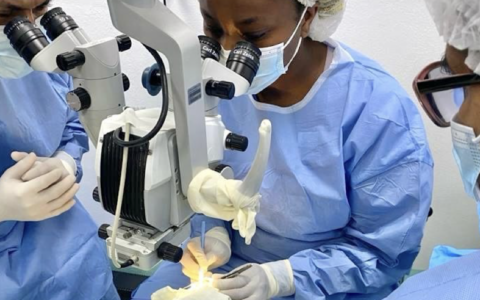Ophthalmology
Research and innovation from Vanderbilt Eye Institute experts

New Model Aims to Advance Discovery in Retinal Research
In Edward Levine’s laboratory at Vanderbilt Eye Institute, obstacles to research are overcome through science, technology and resourceful creativity.
Read MoreLatest in Ophthalmology

Lessons Travel Both Ways in Guyana-based Residency Training
Vanderbilt Eye Institute’s unique international rotation program delivers mutual insights and much-needed surgical care.

Beagle Genomics Spark Advances in Human Glaucoma
Gene variant discovered to cause RGC degeneration in beagles with inherited disease also has causative effects in a mouse model.

Surgeries Save Sight for Child with Rare Ocular Condition
Surgery as an infant allows a 10-year-old girl to thrive in school and life.
Partners in Care
Medical expertise infused with integrated technology allows Vanderbilt Health specialists to build partnerships and elevate care in complex and specialized cases. Browse our referral directory or log into our online portal for referring providers.
Make a Referral
A Lifelong Passion for Eye Health
From supporting groundbreaking research to sponsoring training for young ophthalmologists, Vanderbilt Eye Institute donors Les and Judy Smith have always given where they saw the greatest need.

Novel Treatment Holds Promise for Retinopathy of Prematurity
Layering treatments in this potentially blinding condition may provide infants a better path for prevention of retinal detachment.

Dual Approach to Intermittent Exotropia
A pair of surgeries for childhood intermittent exotropia, or “wandering eye,” demonstrate similar effectiveness, with some nuances.

Predictors of Diabetic Retinopathy Under Scrutiny
Identifying specific inflammation mediators will help retina specialists anticipate and treat factors in retinopathy disease progression.

Expanding Program Helps Visually Impaired Patients Thrive
Through comprehensive care and ongoing support, a low vision clinic helps children and adults with vision loss better navigate their environment.

Atropine Response Varies for Pediatric Myopia
NEI-funded trial finds low-dose eye drops may not be effective at slowing the progression of nearsightedness in some children.